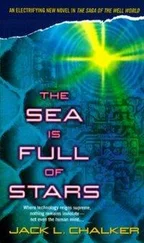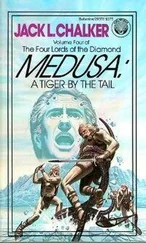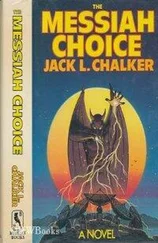“And if they won’t?”
“Then at least we get away.”
He thought it over some more. “Well, what you say is true—up to a point. My only concern is that, unbeknownst even to you, this is a subtle Confederacy plot.”
“Huh? What could I do to you?”
“Oh, not you. But suppose they use all this to get a authorization for planetary destruction? Suppose that’s what they really want—direct cause they can get through the Councils? Their primary, maybe only, objective is to bring these aliens out of the woodwork. Maybe the authorized destruction of Cerberus is the way they’re planning to do that-—and we have no guarantees the aliens will protect us, or be able to. It seems to me that if they could defeat the Confederacy militarily they wouldn’t have needed us in the first place.”
It was a glum thought, one I hadn’t really considered. As sneaky as my bosses had been, was this, then, their goal? Certainly it would be the ultimate goal, to smoke them out. I didn’t like to think of the idea that they expected it all along, though, from me.
“It’s a possibility. A risk. A big risk, I admit. But which is the bigger risk? Not to try it, not to crack this programming code, and still be sitting here when they eventually do get around to excising us? It’s going to happen. You know it and I know it. If they go along, at least we have a chance—all of us.”
Bogen sighed and shook his head, but all his belligerence was gone. “This is too big a decision for me to make, you know. I’m going to have to buck this to Laroo. You, too, probably.”
“Suits me fine.”
I sent back word with the boat crew that I would be remaining at least overnight, and gave Dylan some encouraging news, in the simplest form of code. I didn’t really care if Bogen’s people figured it out or not; if he didn’t have some foreknowledge of me and my nature he didn’t deserve to be in the business.
Then I waited for Bogen to call his boss, and finally he returned. “Okay,” he said, “He’s coming in tomorrow afternoon. Earliest he can get away. You’re to stay here as his guest until he hears you out and makes a final decision.”
“What about my wife?” I asked, somewhat concerned. “She has no credit, remember.”
“She’ll be all right through tomorrow. My people will be there if she needs anything. After that, well, we’ll see. Remember, your future and hers are hanging by a thread right now.”
Didn’t I know it! Still, I was committed now. “Well, since I’m either in or dead, mind letting me see one of these wonders of the universe?”
He thought it over. “Sure. Why not. Come on.”
We rode down in one of the transparent elevators, far beyond the ground floor and into the vast trunk of the main support tree itself.
The lab facilities down there were quite modern and impressive. Along the way I ran into several old Tooker employees who saw and greeted me, but Bogen wasn’t in the mood to let me renew old friendships.
The center of all this activity was an eerie lab in two parts, with a monitoring and control panel of unfamiliar design on one side and a series of small booths along an entire wall. A young and very attractive woman with long black hair trailing down over her traditional lab coat was checking a series of readings on one of the machines as. we entered. She glanced up, saw Bogen, and rose to meet us.
“Here’s the best mind on Cerberus, and one of the best in the whole galaxy,” Bogen beamed.
She smiled and put out a hand. “Zyra Merton,” she introduced herself.
I was startled even as I shook the thin, delicate hand. “Qwin Zhang. Did you say Merton?” She laughed pleasantly. “Yes. You’ve heard the name?”
“I sure have. Somehow, though, my vision was always of some little old man with wild hair and a beard.”
“Well, I am pretty old,” she replied good-humoredly. “In fact, I’m close to a hundred and eighty. The reason why I came here, almost ninety years ago, was not only to study the Warden processes on Cerberus but also because it was at the time the only way to save my life. However, I assure you that I am and have always been a woman, and I’ve never once had a beard.”
I laughed back. She was charming, and a surprising answer to the question of just who Merton really was.
“But tell me, where did you hear my name?” she asked.
“I’m a product of what the Confederacy calls the Merton Process,” I told her.
She seemed very interested. “You mean they solved the problems? It cost too many lives and too many people’s sanity ever to be very practical, I thought. I abandoned that research when I turned entirely to researching Cerberan processes. That was—let me see—fifty years or so ago.”
“Well, they solved some of it,” I told her. “Not the attrition rate, though.”
She looked disappointed and a bit angry. “Damn them! Damn me! My biggest regret has always been that I developed the thing to begin with and sent out the data in so incomplete a form. Still, in those days there were few people here, and not much technology or governmental structure, and I was dependent on outside support to get anywhere. Still, I’d like to give you a complete psych scan sometime, just to find out how far they did go with it. It’s a dead end beyond what you say, I fear.”
I decided not to tell her how much of a success the Confederacy thought it was. Out of respect for my counterparts on Lilith, Medusa, and Charon, I didn’t want to blow too much right now.
“I’ll be glad to—sometime,” I told her sincerely. If I could trust anybody on this crazy ball it was probably her, if only for her scientific detachment.
“Zhang’s interested in our friends,” Bogen told her. “Can you give us a bit of a demonstration?”
She nodded. “Glad to. Got one that’s just about ripe.”
“Ripe?”
“Finished. Complete. Ready to go.” She went back to her instruments and punched in a series of instructions. A slight buzzer sounded over one of the booths, and a red light came on. After a moment the red light went out and was replaced by an amber standby, then a green.
She left her panel, went over, and opened the door to one of the booths. The sight revealed startled me. It was the body of a tall, muscular man to civilized worlds’ norm. He looked recently dead.
“Two one two six seven—awake and step out,” she instructed.
The cadaver stirred, opened its eyes, and looked around, and into its whole body came an eerie sense of life, of full animation. It walked out of the box, suddenly appearing very natural.
I went over and looked at him. Doing so made me a little uncomfortable, because suddenly it was a person and not a thing I was eyeing as I would a piece of sculpture.
“The most amazing marriage of organic chemistry, computer, and molecular biology I have ever seen or known,” Merton told me.
“This is a robot?”
She nodded. “They don’t come packaged exactly like this, I should tell you. They arrive in a roughly human-old shape and with the same mass, but that’s about all. From cell samples supplied us, we’re able to graft an entire skin onto it so perfectly that it is an exact duplicate of whoever’s cell we use. The material we use for it is similar to the stuff used on the entire device, but it’s capable of following and using the genetic code of the original. When we have the original subject handy, it can add in moments any scars, blemishes, or oddities to make itself a complete duplicate.”
“How the hell can you make something like this?” I gasped.
“We don’t, and can’t. The Confederacy could if it wanted to. Even then, the design would be different. It takes very little time in close examination to see these devices are the product of a society and culture that is extremely alien to our own. Not that scientific laws are violated—they aren’t. But the whole evolution of science up to this point came from a far different series of steps.”
Читать дальше












